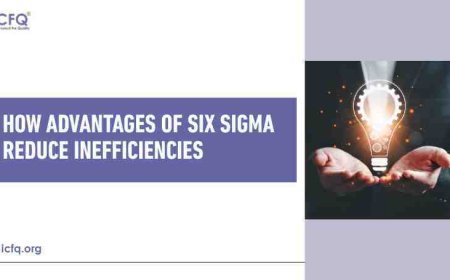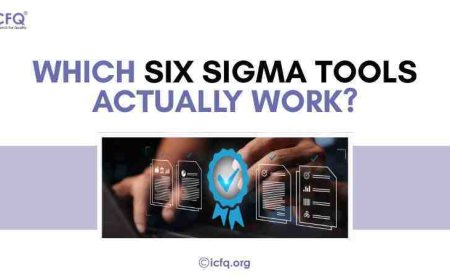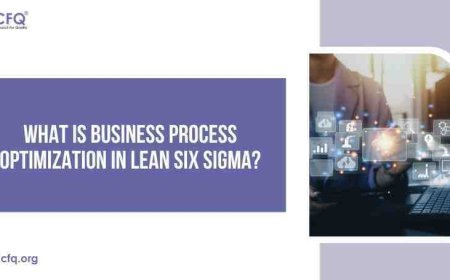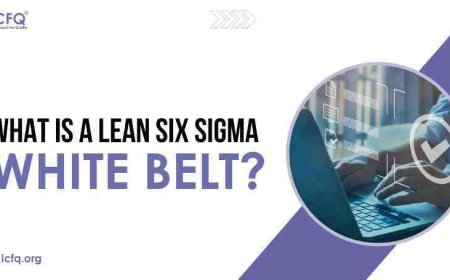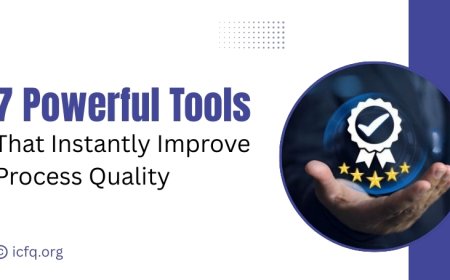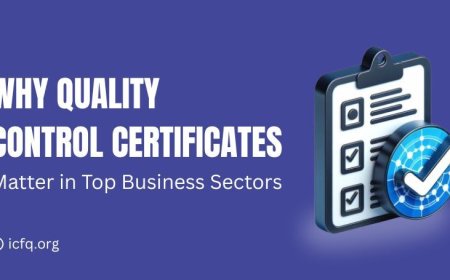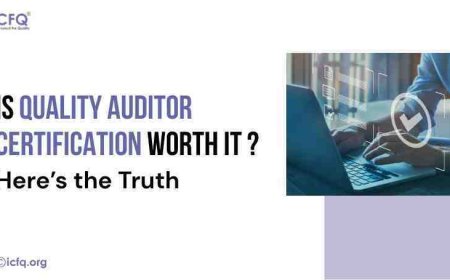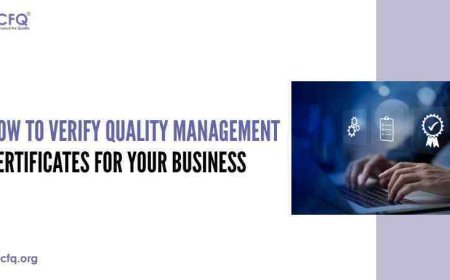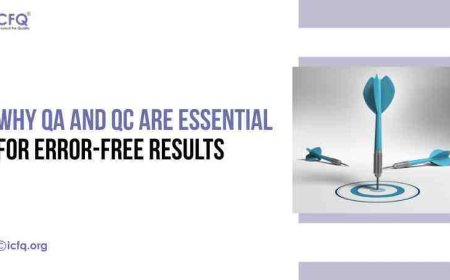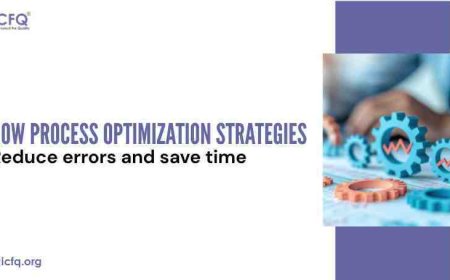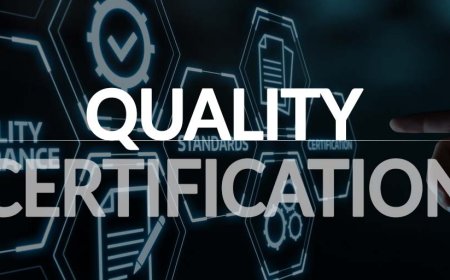What Is ISO 9001 Certification? A Simple Guide
A simple guide to ISO 9001 Certification, what it is, why it’s important, and how to get certified to improve quality and customer trust.
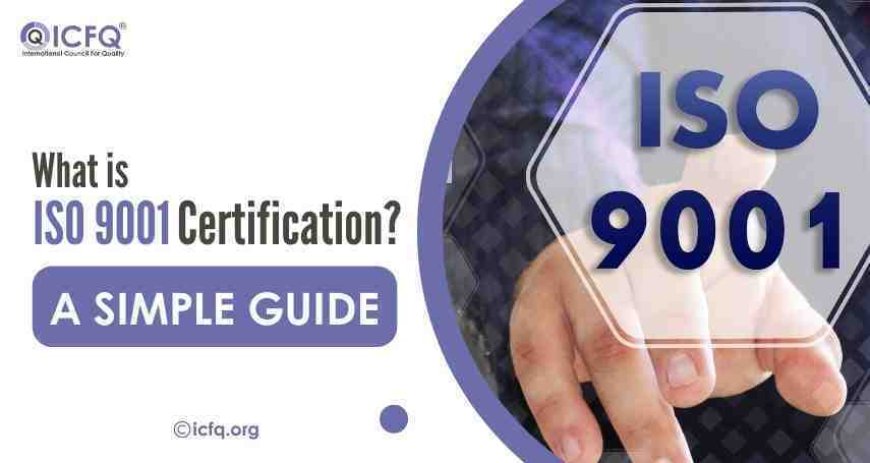
In my experience working with businesses on quality standards, I’ve learned that the real value of ISO 9001 Certification is not just in holding the certificate, it’s in how well a company lives by its principles every day. Many organizations proudly display their ISO badge, but what truly sets them apart is how they use the framework to deliver consistent quality and improve customer trust.
Business needs keep changing. Years ago, companies were mainly worried about basic product quality; today, they must deal with global competition, automation, sustainability, and rising customer expectations. This means an ISO 9001 Certification earned years ago is still valid, but its impact depends on how regularly the business reviews, updates, and applies those standards in line with modern demands.
Companies that see ISO 9001 as a “one-time achievement” may struggle to keep pace. But those who treat it as a continuous improvement journey are the ones who stay competitive, build stronger systems, and gain long-term customer loyalty.
What Is ISO 9001 Certification?
What is ISO 9001 Certification? It is an international standard for Quality Management Systems (QMS) created by the International Organization for Standardization (ISO). It provides a framework that helps businesses ensure their products and services consistently meet customer and regulatory requirements.
In simple words, ISO 9001 is proof that a company has the right systems in place to deliver quality, improve processes, and keep customers satisfied. It is the most widely used ISO standard in the world, with over 1 million businesses in 170+ countries certified.
This certification is not limited to large organizations, it applies to companies of all sizes and across industries like manufacturing, IT, healthcare, education, and construction. Even an ISO 9001 2015 certified company gains credibility in global markets, as it proves its commitment to maintaining international quality standards.
Why Is ISO 9001 Important for Businesses?
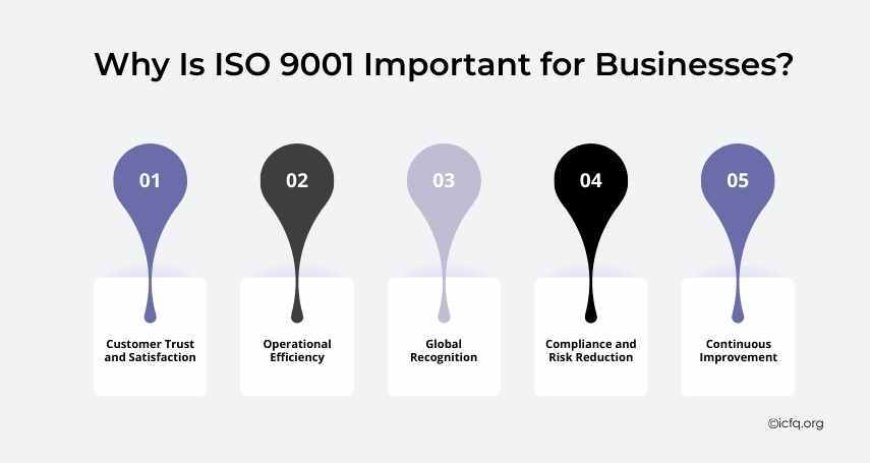
ISO 9001 is important for businesses because it builds trust, efficiency, and growth. It shows that your company can deliver quality consistently, which strengthens customer confidence and gives you a stronger position than your competitors.
Here are key reasons why it matters:
-
Customer Trust and Satisfaction – Certification proves you meet international ISO 9001 standards, which helps retain customers and attract new ones.
-
Operational Efficiency – By following ISO 9001 processes, businesses reduce errors, save costs, and streamline operations.
-
Global Recognition – ISO 9001 is accepted worldwide, opening doors to new markets and bigger partnerships.
-
Compliance and Risk Reduction – It ensures your business follows regulations and reduces risks of quality failures or penalties.
-
Continuous Improvement – ISO 9001 is not a one-time certificate; it encourages ongoing process improvement.
Core Principles of ISO 9001
ISO 9001 Certification is based on seven simple but powerful principles that guide businesses toward quality and growth:
-
Customer Focus – Always put customer needs first and work to keep them satisfied.
-
Leadership – Strong direction from top management ensures everyone is working toward the same goals.
-
People Involvement – Every team member plays a role in delivering quality results.
-
Process Approach – Treat tasks as connected steps that work together for better outcomes.
-
Continuous Improvement – Keep finding ways to make products, services, and processes better.
-
Decisions Based on Facts – Use real data and evidence to make smart business choices.
-
Strong Relationships – Build trust with partners, suppliers, and stakeholders for long-term success.
Steps to Get ISO 9001 Certification
Many businesses wonder how to get ISO 9001 Certification. While the process may look complex, it can be done smoothly if you follow these steps:
-
Understand the Standard – Learn what ISO 9001 is and how it applies to your business.
-
Gap Analysis – Check where your current processes stand compared to ISO 9001 standards.
-
Plan and Prepare – Create an action plan, set timelines, and assign responsibilities.
-
Train Employees – Make sure your team understands quality processes and their roles in them.
-
Implement Changes – Update workflows, policies, and systems to meet ISO 9001 standards.
-
Internal Audit – Test your new system with an internal review to find and fix issues.
-
Management Review – Let top management review the system to ensure it is effective.
-
Certification Audit – Invite an external auditor to check compliance and grant certification.
For IT organizations, meeting ISO 9001 IT requirements is especially important to ensure secure, efficient, and error-free processes.
Industries That Benefit Most from ISO 9001
ISO 9001 Certification is not limited to one type of business. It can help companies in many fields improve quality, build customer trust, and grow stronger. Some industries where ISO 9001 brings the most value include:
-
Manufacturing – Ensures products are made with consistent quality and fewer defects.
-
Healthcare – Improves patient safety, service quality, and compliance with standards.
-
IT and Software – Builds reliable systems, reduces errors, and improves customer satisfaction by meeting ISO 9001 IT requirements.
-
Construction – Helps manage projects better, avoid mistakes, and meet deadlines.
-
Food and Beverage – Maintains hygiene, safety, and consistent product quality.
-
Education and Training – Improves teaching quality, student satisfaction, and credibility.
-
Logistics and Supply Chain – Reduces delays, errors, and improves delivery performance.
Common Myths About ISO 9001 Certification
-
“It’s only for big companies.” – In reality, small businesses also benefit by building credibility.
-
“It’s just paperwork.” – ISO 9001 focuses on real process improvements, not just documentation.
-
“It guarantees product quality.” – It ensures consistent processes, which in turn lead to quality products.
Challenges Businesses Face Without ISO 9001
When a business does not follow ISO 9001 standards, it often struggles with problems that affect both performance and reputation. Some common challenges include:
-
Inconsistent Quality – Products or services may vary, leading to unhappy customers.
-
Customer Complaints – Without proper systems, businesses face repeated complaints and loss of trust.
-
Poor Process Control – Workflows are not well managed, which creates delays and errors.
-
Limited Market Access – Many clients and global markets prefer or require an ISO 9001:2015 certified company.
-
Lower Efficiency – Without clear processes, resources are wasted, and productivity suffers.
-
Reputation Risks – Businesses may be seen as less reliable compared to certified competitors.
Future of ISO 9001 Certification
As businesses keep changing, ISO 9001 Certification is also moving forward to meet new needs. Some key future directions include:
-
Use of AI and Automation – Quality checks will become smarter and faster with the help of technology.
-
Focus on Sustainability – Companies will be encouraged to follow eco-friendly and green practices.
-
Digital Audits – More audits will be done online, making the process quicker and easier.
-
Global Reach – ISO 9001 will continue to gain wider acceptance, especially in growing markets.
These trends show that ISO 9001 will remain an important tool for building trust, improving quality, and staying competitive in the future.
So, what is ISO 9001 Certification really about? It’s not just a certificate; it shows that your business values quality, consistency, and customer satisfaction. From improving efficiency to gaining global trust, ISO 9001 is a strong step toward long-term success.
By following ISO 9001 standards, businesses can build better systems, reduce risks, and win customer confidence. In today’s world, where clients expect the best, this certification helps your business not just meet standards but go beyond them.
